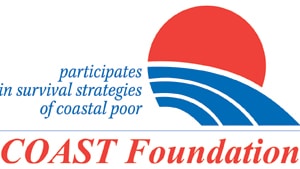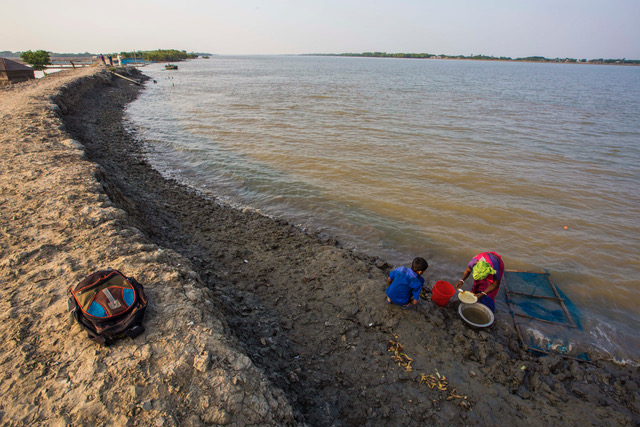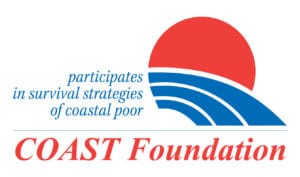Stop foreign vessels from intruding into Bangladesh marine fishing territory
Dignified compensation for the fishing ban
Plan for permanent fishing-focused employment
Fishing is a keystone of the economy of Bangladesh, representing the long cultural heritage of the people of the country. The nation has achieved significant milestones in fish production. The country ranked third in the global farmed and freshwater fish production and first in Hilsa production. Bangladesh exported 69.88 thousand tonnes of fish and fish products in 2022-2023, generating $41 million, and contributing 2.43% to the country’s
GDP.
The fishing sector of the country directly and indirectly engages nearly 20 million people, including 1.4 million women. Fish constitutes about 60% of the animal protein in the national diet, highlighting its critical role in national food security.
The fishing community in Bangladesh face a 147-day annual fishing ban, which includes a 22-day ban on Hilsa reserves in October, a 60-day ban on Hilsa sanctuaries in March-April, and a 65-day ban from May 20 to July 23. These bans are crucial for the breeding and conservation of marine and sustainable fisheries.
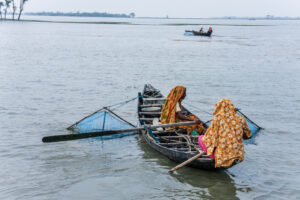 However, these fishing bans severely impact coastal fishers who hardly have any alternative livelihood. The government of Bangladesh allocate 40 kg of rice for each family per month during these ban periods. This allocation is often found insufficient for families who need more and there are challenges in distribution.
However, these fishing bans severely impact coastal fishers who hardly have any alternative livelihood. The government of Bangladesh allocate 40 kg of rice for each family per month during these ban periods. This allocation is often found insufficient for families who need more and there are challenges in distribution.
According to the Department of Fisheries, there are 2.45 million fishers in Bangladesh, out of which 1.62 million are registered under the national database. In the coastal districts of Bhola, Cox’s Bazar, Barguna, Patuakhali, Bagerhat, Lakshmipur, and Noakhali, there are 0.82 million registered fisherfolk, but only 700 thousand out of them received ID cards. Consequently, many registered fishers do not receive government assistance. The total number of registered and unregistered fishers in these districts varies from 1.2 to 1.5 million. There is no declared government plan for supporting these fishers and their families during the 65-day fishing ban. It is reported that many non-fishers with ID cards received government support, while genuinely needy fishers are left out.
Generally, fishing community people in Bangladesh are very poor and they face severe economic hardships during the bans. A survey by COAST Foundation in 2022 found that 23.3% of fishing families earn less than $42.47 a month during the ban periods and 60.8% earn almost nothing. 79.9% of respondents borrow from local loan sharks, which leads to increased violence against women (51.8%) and psychological distress (67.4%). The bans aggravate food insecurity, when only 51% of families somehow manage three meals a day compared to 95% in the normal period.
51.5% of the respondents received government support later than expected time and 94.1% found it insufficient for their families. Female fish workers, particularly those who lead their families, face more challenges. 63% earn less than their male counterparts for the same work.
Fishers in Bangladesh generally belong to the lower class and are treated as outcasts. They face various forms of harassment while receiving government food aid. Other challenges like debt pressure, advanced labour sales, no education facilities for children, lack of medical services, and lack of alternative income force them to live like slaves.
Around 85% of coastal fishers complained about the intrusion of foreign vessels, particularly Indian vessels, who come to fish in Bangladeshi waters right before the ban lifts and they snatch away the best harvest. When the fish stock is refilled by the sacrifice of millions of fishers during the ban, foreign vessels come and ruin the benefit of the ban. This illegal activity deprives Bangladeshi fishers of their rightful catch. Out of an estimated 8 million tonnes of fish harvested from the Bay of Bengal annually, Bangladeshi fishers manage to catch only 70,000 tonnes.
The 6th indicator of the 14th goal of the SDG announced by the UN in 2015 is the conservation of marine fish and other resources. That’s why the UN has asked the World Trade Organization to create rules to stop government subsidy that encourages overfishing in the sea. However, this responsibility has fallen only on developing countries such as Bangladesh, India, Indonesia etc. Some rich countries have been historically subsidising this overfishing and already damaged the global marine fish stock and now the rules are imposed on the developing and least developed countries.
WTO is forcing Bangladesh not to subsidise marine fishing in the name of saving the global marine fish stock while only 17% of the country’s fish production comes from the sea.
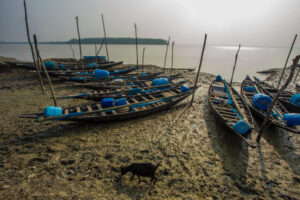 Demands for Socio-economic Development and Fair Rights
Demands for Socio-economic Development and Fair Rights
- We demand to revise the list of fishers for the government support program to identify the ineligible recipients and include the genuine fisher families who are in need.
- Measures should be taken to prevent foreign fishing vessels from illegally entering into Bangladeshi waters, especially just before the ban ends.
- Coordinate fishing ban periods with neighbouring countries to ensure fairness and protect local fisher’s interests. We need to prevent foreign vessels from harvesting the
Bangladeshi fishers’ sacrifice during the ban. - Provide at least 60 kg of rice and $68 in cash per month to fishers during bans to meet their families’ needs. This is still very minimal.
- Develop fisheries-oriented employment along with low-interest loans and grants, particularly for women fishers for processing, drying and marketing fish.
- Implement measures to address increased domestic violence during fishing bans.
- Ensure sanitation, healthcare and vocational education for fisher families.
- Allocate the necessary budget for research and skill development to introduce the blue economy which can open the door for thousands of fishers in the coastal area.
- Financial support for modern fishing trawlers and technology and skills development for increasing the fishing efficiency to sustainably increase fish catch and supply to the global market.
- Allocate funds from the Climate Trust Fund for fisher’s welfare.
- The government should restrict large fishing trawlers from fishing within 20 nautical miles (37 km) of the coast to protect small-scale fishers.
- A few small-scale fishers in rural Bangladesh are way smaller than the global definition, including women and children, who have no investment. They are ultra-poor individuals who collect small amounts of fish. They should be kept out of the ban as they are unable to affect fish conservation.
- The fishing community are not aware of the VGSSF (Voluntary Guidelines for Securing Sustainable Small-Scale Fisheries) and that’s why it is difficult for them to plan accordingly. Initiatives should be taken to develop their knowledge on it to ensure their rights.
- The fishing community in Bangladesh also don’t have any idea about their customary and tenure rights in marine fishing. Initiatives for their knowledge and awareness on
this topic are necessary and the government of Bangladesh should take necessary measures.
COAST Foundation, House 13, Metro Melody, 1st Floor, Road 2, Shyamoli, Dhaka 1207, Bangladesh. e: info@coastbd.net, www.coastbd.net


